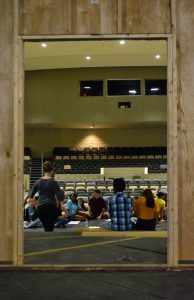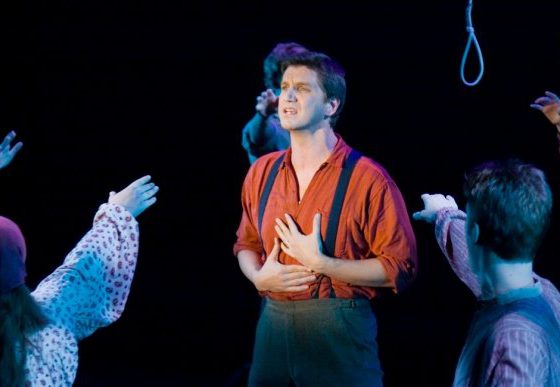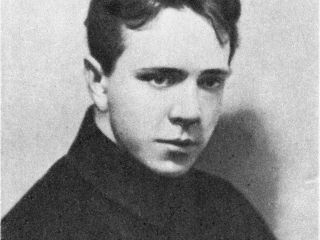Congratulations! You’re directing your first show and are probably feeling a little overwhelmed right now — which is totally normal. Whether you are directing at a school or with a community theater, all directors have the same starting point: choosing the show. Selecting the show requires considering many factors, including people, time frame, budget. And then, after the show is chosen, you now have many things to consider before auditions even start, and all of these things can be broken down into two categories: aesthetics and logistics.
Aesthetics is the artistic vision you have for the show. While having a “vision” might seem like a pretentious cliche, it’s necessary as it will be the guiding force for your decisions. The most successful shows have a unifying concept, what some directors will call a “dramatic action statement,” and in literary circles is referred to as a theme. This concept is the director’s interpretation of the show, and is what makes this particular production unique. For example, Beauty and the Beast is one of the most popular musicals for high schools to produce, but each school has its own individual stamp on the show.
With a dramatic action statement in mind, you can make decisions about everything from characters to staging to set to costumes. What do you want your show to look like, sound like, and feel like? What impact do you want to have on your audience? While the typical theatre-goer will not pick up on every nuanced decision you’ve made, they will understand the overall impact of these decisions on the presentation.

For example, several years ago I directed Les Misérables, and I determined that the driving force of the show was the search for redemption. With this in mind, I could talk with my actors about their character objectives and why they made particular acting choices. Valjean and Javert were often staged as opposing forces, and they would circle each other during important moments, such as their confrontation at Fantine’s death. This blocking helped us talk about how the characters saw themselves in opposition to each other, why Javert chases Valjean for so long, and why Valjean consistently forgave Javert. I also costumed characters in complementary ways: in the opening prologue, Valjean’s prison costume was dark blue. Later, any characters that he impacted in a positive way — both for that character and in his own search for redemption — were in blue, including Fantine, Cosette, and Eponine. These were subtle choices, and whether the audience picked up on these cues is not as important as how these choices helped the actors understand the world of the show and convey that world to their audience.
After you’ve made choices for your aesthetics, you need to consider how to implement those for your show, and this is where logistics are important. Logistics are the procedures for the show, and include both the calendar and the people. Your calendar is not just the rehearsal schedule — which should include dates, characters/actors called, and the objectives for each meeting — but also the deadlines for the business of the show: set construction, costumes, marketing, and advertising.
Consistency is key for rehearsals — not only will you have an overall calendar that outlines the material for each day, but also you should have a process for each rehearsal, and be as true to that process as possible. Actors (no matter their age) want to know what they’ll be doing and how it will work. When they can predict how rehearsals will function, they’ll be happier – and you’ll have fewer actors coming to you with, “What are we doing today?” For example, my Les Miserables rehearsals had a set schedule – necessary for wrangling 65 teenagers for two and half hours every day! The first five minutes were basic announcements and a quick overview of that day’s objectives. The next 15 minutes focused on vocal warm-ups and music review, and the following 45 minutes focused on learning the next musical section; some rehearsals had the whole company, while others had only a dozen or so actors. After a water and restroom break, the last half of rehearsal was working on staging and characterization along with the music. My actors knew what to expect everyday, and if something changed, I gave them a clear explanation of what was changing and why it was changing.
Finally, you need a person to help keep you on track. Every great director has a great stage manager — someone who is knowledgeable, organized, responsible, and trustworthy. This stage manager will support you in every aspect of the show — while you are making the decisions, the stage manager is enforcing them. This person will know, understand, and support your vision of the show and act as the communication between those decisions and the technical crew. For me, my most successful and trusted stage managers never hesitated to ask me questions — not to challenge me, but instead to help me process through my choices and how to best explain those choices to my actors and crew.

I reached out to two of my former students, Carlos and Britney, who directed their peers in full-length shows. I asked these students what they wish they had known, and what they thought was most important to know for someone directing his or her first show. Carlos said that it’s important “to remember that it’s okay to reach out to other people when you get confused or lost in the process — don’t be afraid to ask questions.” Britney echoed that sentiment, and added that she was prepared by “working with a lot of different directors to see how I’d like to translate my direction on stage.” Both of these students put on successful shows, and despite all of their stress and worry about the show, they had a wonderful time and were proud of their work.
As a first-time director, you will feel overwhelmed, stressed out, and unsure of your choices. You’ll make some mistakes, and learn from them. All of this is totally normal — and many veteran directors feel the same way. But no matter what, remind yourself why you wanted to direct this show in the first place. Remember the story, remember how you want to tell it, and have fun. As I tell my students, we call it a “play” for a reason!














